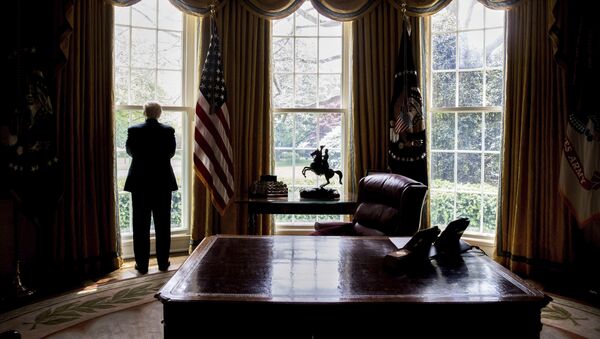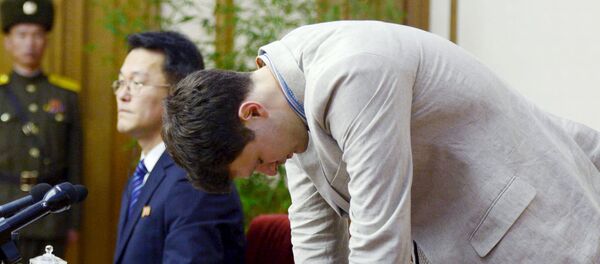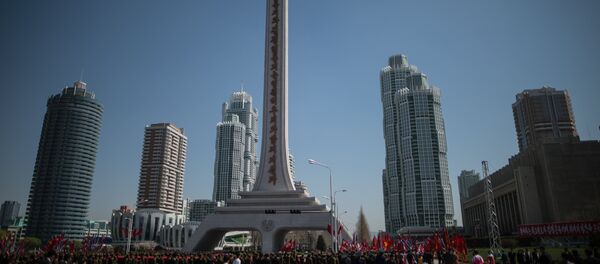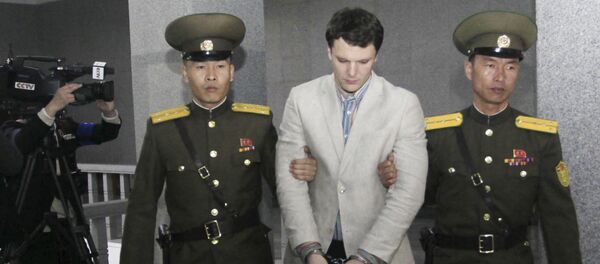The idea was first broached in March when Tony Kim, a Korean-American who was conducting humanitarian aid for those affected by the August 2016 flooding, was detained in Pyongyang.
"It's a total disgrace what happened to Otto. That should never ever be allowed to happen," US President Donald Trump said Tuesday. "Frankly, if he were brought home sooner, I think the result would have been a lot different."
"Otto's fate deepens my administration's determination to prevent such tragedies from befalling innocent people at the hands of regimes that do not respect the rule of law or basic human decency."
Other White House leaders echoed the president, such as Secretary of State Rex Tillerson, who called for a travel visa restriction that would make American passports invalid for travel to North Korea. The White House could do such a thing unilaterally, but a full travel ban would require Congressional approval.
Many in Congress have vocally expressed their fury with North Korea over the fate of Warmbier. Ed Royce (R-CA), chair of the House Foreign Affairs Committee, said that "travel propaganda lures far too many people to North Korea. This is a regime that regularly kidnaps foreign citizens and keeps 120,000 North Koreans in barbaric gulags. The United States should ban tourist travel to North Korea."
Tourism to North Korea "helps to fund one of the most brutal and despotic regimes in the world," said Rep. Adam Schiff (D-CA.) in a statement to USA Today. "The barbaric treatment of Otto Warmbier by the North Korean regime amounts to the murder of a US citizen." Schiff, along with Rep. Joe Wilson (R-SC), is pushing the North Korea travel Control Act, which would place a moratorium on American tourism to North Korea.
"Make no mistake: The regime seeks out Western tourists. Their advertising is a continuation of domestic propaganda promoting exotic locations and 'safe' experiences. Some go so far as to claim that no person has been detained while on one of their trips. Worse, they claim that tourism is a form of liberalization for the country – allegedly opening up revenue, opportunity and the citizens to outside cultures," Wilson wrote in an opinion column published by US News.
"Sadly, like most everything else in North Korea, that is a shiny farce, covering up the truth of the regime."
"We don't have a lot of leverage, but I would support the travel ban. I would support effective ways to modify North Korea's behavior," said Rep. Steny Hoyer (D-MD), the House Democratic Whip. "The Chinese are the best way to do it — it's difficult for the rest of the world to do it — but it ought to be done."
At least one prominent leader has spoken against a travel ban: Senate Armed Services Chairman John McCain. He said that a travel ban would unduly harm the relationship between the US and the DPRK, already hostile at best. "I think first we need to warn Americans that they should not go and that their lives are endangered if they go," McCain said on Tuesday.
The United States has no official diplomatic relationship with North Korea, and the negotiations that took place prior to Warmbier's release were the first direct contact between officials of the two nations in several years.
The United States does not have a travel ban against any country at present. Roughly 1,000 Americans travel to North Korea as tourists every year.





